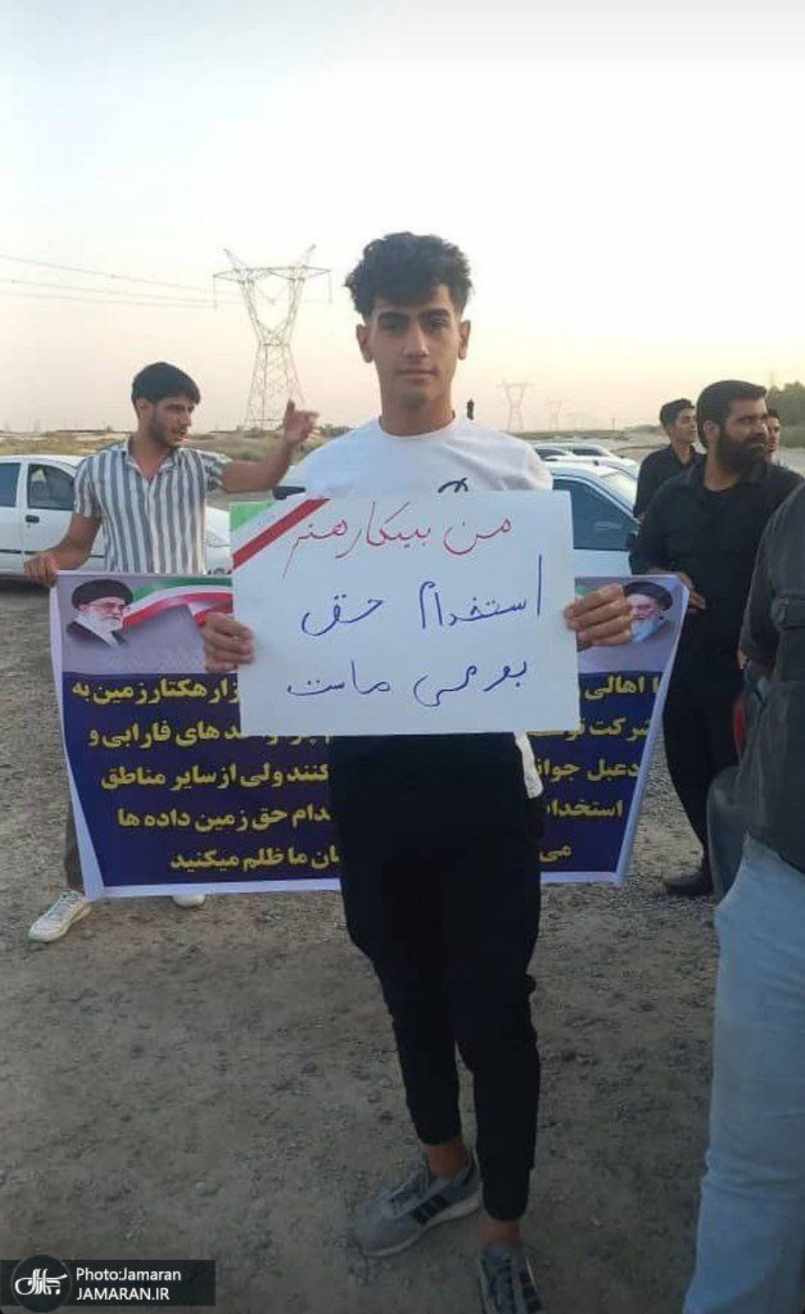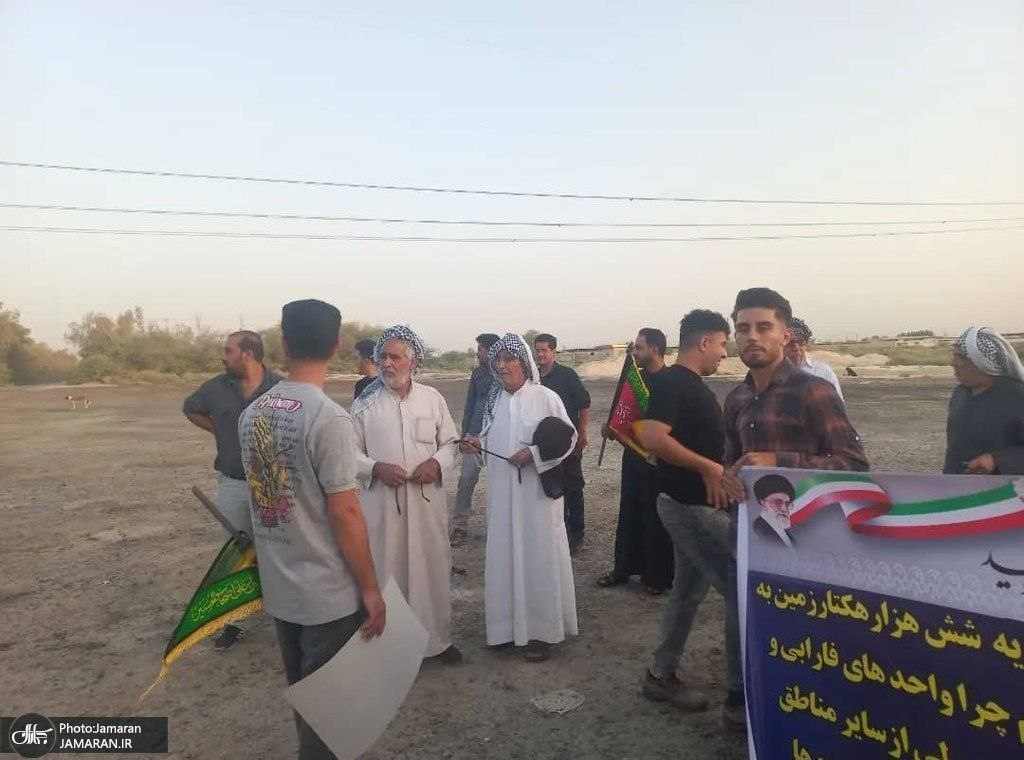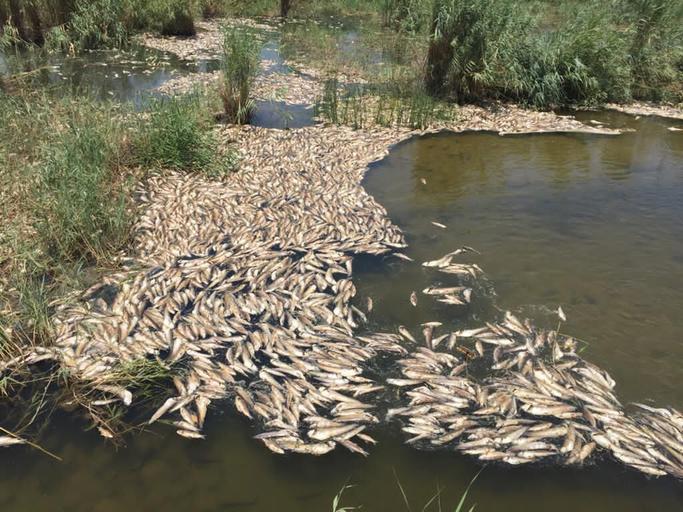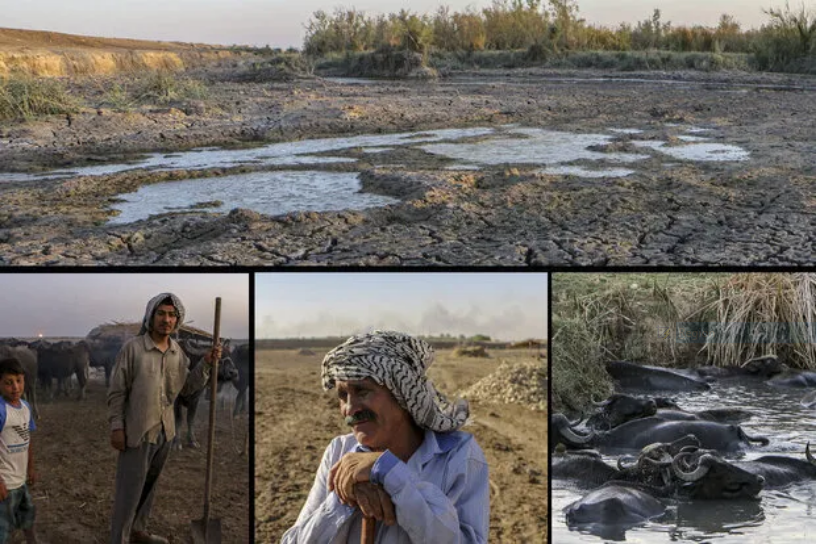Ahwazis from rural areas of the Ahwaz region held a demonstration on 8 August 2023 outside the offices of the Iranian regime’s state-run Dabal Khazai and Farabi sugarcane refinery corporations, denouncing the companies’ racist staff recruitment policies.
Ahwazi rights groups in the Ahwaz region of south and southwest Iran reported that residents of the villages of al-Mubarakia and al-Khudairat held placards and chanted slogans denouncing the blatantly discriminatory practices of the sugarcane companies which have seized thousands of acres of lands from Ahwazi farmers and rural communities for the loss-making and environmentally catastrophic sugar industry, while refusing to employ the local Ahwazi people in any but a very few menial positions. Instead, adding insult to injury, the regime-owned companies bring in ethnically Persian immigrants from other areas of Iran to manage and run the sugarcane plantations and the refineries, providing them with well-appointed homes in settlements especially built to house them, often razing the original villages and farms to build these settlements, where Ahwazis are not allowed to live.
The activists reported that the sugarcane companies have forcibly confiscated at least 6,000 hectares of land from farmers and communities in the rural area in the past two decades without compensating the owners.
The companies are helped in the operations to drive the local Ahwazi rural population from their homes and lands by heavily armed regime security and military forces, including personnel from the regime’s infamous so-called Islamic Revolutionary Guard Corps (IRGC), who also provide protection for the plantations and refineries.

During their demonstration, the protesters called for changes to the companies’ blatantly structural racism in employment policies. It was also revealed that many of those Ahwazi Arabs forced to leave their ancestral lands to make way for the sugarcane companies had been told that the regime was going to help increase agricultural productivity, while others were promised that they could get jobs at the sugar plantations and refineries in exchange for giving up their homes and lands; needless to say, all the regime’s claims and promises were wholly false.
The Ahwazi protesters strongly condemned the sugar companies’ confiscation of their property and the broken promises of jobs in return for giving up their lands, which they labelled a cruel fraud. Instead, they’ve been left penniless, homeless, jobless, and in many cases destitute.

Another issue raised during the protest was the sugarcane company’s indifference to the environmental devastation unleashed by their practices, with the refineries pumping toxic chemicals used during the refining process back into local rivers and wetlands already suffering as a result of the massive network of upriver dams and pipelines diverting water to other, ethnically Persian regions of Iran; this results in heavy salination and poisons the groundwater in surrounding areas which in turn leaves the remaining farmland barren and incapable of sustaining food crops, leading to increasingly widespread desertification.
Adding further to the local Ahwazi people’s woes, the sugar companies have also failed to fulfil their pledges to carry out improvements to villages and towns in the local area, including providing electricity to public streets, creating parks, etc. Instead, the protesters said, the sugar companies are poisoning the environment in rural areas and impoverishing the local Ahwazi Arab population, with the refineries’ only ‘contribution’ being steadily increasing pollution of the air, land and water.

Ahwazis ‘ anger is steadily rising. Speaking to a human rights activist in Ahwaz, one of the protesters at last week’s demonstration said, “Everybody knows why the sugar company refuses to employ Ahwazis and fulfil its pledges. It aims to drive Ahwazis to leave their homeland, to impose Persian settlers in their place. Let’s be clear about this – we are being subjected to a violent form of discrimination and colonisation”.
The protester went on, “Here, these companies are carrying out a violent form of environmental destruction, an invisible violence against the environment and local Ahwazi people – this environmental violence will be visible when you visit our streets and when our people see the result of this vicious environmental destruction and exploitation coming back violently on our lives as we struggle to survive – but how long must we wait? When I say their actions are violent, I mean the result of these actions leading to a slow death of the lands and the local Ahwazi population; they made our lands graveyards and every year, we bury dozens due to cancer and many illnesses from unknown diseases due to burning of sugar cane leaves and the pollution of our water. Now the size of our cemeteries is getting bigger than the size of our villages, with local people dying in their 40s or before that due to pollution.”
In the same context, another Ahwazi protester wondered about the Shireen Shahr settlement specially constructed for Persian immigrants. He exclaimed: What kind of justice is this that legalises cutting off water from farmers, confiscating their lands, causing them to suffer the woes of unemployment while bringing immigrants, granting them jobs, housing them in well-prepare housing units, while leaving us without even drinkable water?!”
This comes at a time when many areas in Ahwaz, near agricultural lands affiliated with the sugarcane company, have seen a marked deterioration in their environment and living conditions in recent years due to the company’s refusal to compensate local residents after confiscating their agricultural lands, with the company even still contaminating their remaining lands with wastewater. The confiscation has been achieved through excessive force, intimidation and even imprisonment, leading to local Ahwazi Arab residents losing their sole source of breadwinning. This has led to increasing levels of poverty and deprivation, which turned these areas into marginalised communities.

